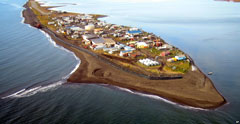 Stephen Sackur took the BBC’s HARDtalk programme on the road in Alaska in a climate change episode screened a few days ago. It was the kind of aware and intelligent journalism one hopes to see on the topic, and deserves plaudits. Not that it exceeded what we have a right to expect from major mainstream television, but it was all the more welcome because the medium so rarely tackles the climate change question. It also represented a considerable advance on the Sackur interview I discussed on Hot Topic a couple of years ago when he attacked Rajendra Pachauri and the IPCC on spurious grounds.
Stephen Sackur took the BBC’s HARDtalk programme on the road in Alaska in a climate change episode screened a few days ago. It was the kind of aware and intelligent journalism one hopes to see on the topic, and deserves plaudits. Not that it exceeded what we have a right to expect from major mainstream television, but it was all the more welcome because the medium so rarely tackles the climate change question. It also represented a considerable advance on the Sackur interview I discussed on Hot Topic a couple of years ago when he attacked Rajendra Pachauri and the IPCC on spurious grounds.
Sackur began in the coastal Inuit village of Kivalina, whose days are numbered as sea ice disappears and storm surges are unimpeded. (I reviewed Christine Shearer’s book on Kivalina in 2011.) The programme was stark in its Alaskan juxtapositions. On the one hand it detailed some of the impacts of climate change on Inuit communities. Kivalina is not alone. Retreating ice, slowly rising sea levels and increased coastal erosion have left three Inuit settlements facing imminent destruction, and at least eight more at serious risk. The town of Barrow depends on bowhead whale and seal hunting which is now affected very badly by the early breakup of sea ice.
On the other hand Sackur encountered the confident determination of oil and gas interests, strongly supported by a state government almost entirely dependent on revenue from the oil industry, to continue exploration and extraction offshore as the sea ice melts. Kara Moriarty, executive director of the Alaska Oil and Gas Federation, recited a familiar litany of claims that the climate is always changing, that any current warming is not primarily driven by the burning of fossil fuels, and that we will adapt to whatever changes come along. “The reality is the Arctic is going to be developed.” Much better, she claimed, that it be developed by the US which takes good care of protecting the local environment than Russia, which doesn’t. The deputy commissioner of Alaska’s Department of Natural Resources, Ed Fogels, affirmed that there was no intention to pull back on oil and gas development because of climate change concerns. He claimed it was impossible to draw a line and say this much extraction but no more.
Sackur was clear that the plight of Inuit populations wasn’t going to weigh against the wealth promised by fossil fuel exploitation:
And when it comes to balancing two conflicting pressures – a rapidly changing climate on the one hand, the demand to expand the state’s carbon-fuelled economy on the other – there is little doubt where the priority lies.
Incidentally, while I was watching the interviews with Moriarty and Fogels I felt I might as well have been watching John Key in the promotional message he delivered in the video which Gareth appropriately described as beyond parody in a recent post. Key didn’t mention climate change, but if he was pressed he would no doubt be incredulous that the country might be expected to forgo the promise of greatly increased oil and gas wealth.
The full video of the HARDtalk programme is not available to viewers outside the UK, but the BBC online magazine carries an article written by Sackur which communicates much of what is conveyed on screen.
However there is one short clip available, and it’s an important one well worth viewing. It records a brief interview, out on the thinning ice, which Sackur conducted with Ignatius Rigor, Professor of Oceanography at Washington State University. Rigor and his team were measuring the thinning of the sea ice. This episode in the programme makes it absolutely clear why the immediate economic needs of the state of Alaska, however pressing, have to give way to the imperative to retain as much of the planet’s ice as remains possible if we are to avoid the worst consequences of climate change. Rigor explains the increased heat that would ensue with the melting of polar ice, including the potential of melting permafrost to release emissions as substantial as those which come from burning fossil fuels. To Sackur’s comment that all this seems to provide more reasons to be alarmed Rigor replies:
We can justify these numbers scientifically and so we report this and try to be objective when we report it, but yes [they’re] scary numbers.
Sackur’s programme did three things that the news media should be regularly providing. First, he reported unequivocally the adverse impacts of climate change that are already being experienced by some humans, often poorer people. Second, he reported, also unequivocally, the considered judgment of scientists whose work bears on human-caused climate change that there is much reason for alarm. Third, he placed in the context of these realities the protestations of companies and states that fossil fuel exploitation must continue and allowed their hollowness to be seen. That’s not advocacy journalism – though I have no objection to declared advocacy – but the kind of straightforward reportage on which modern democratic society depends.

One thought on “HARDtalk on thin ice in Alaska”